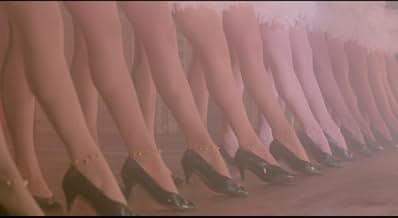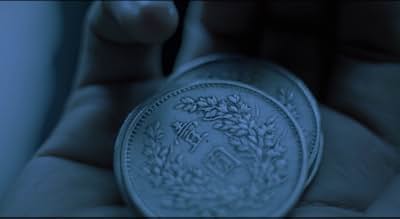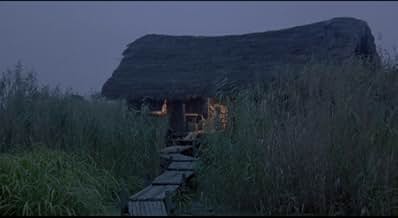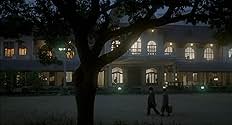IMDb RATING
7.1/10
6.3K
YOUR RATING
A provincial boy related to a Shanghai crime family is recruited by his uncle into cosmopolitan Shanghai in the 1930s to be a servant to a ganglord's mistress.A provincial boy related to a Shanghai crime family is recruited by his uncle into cosmopolitan Shanghai in the 1930s to be a servant to a ganglord's mistress.A provincial boy related to a Shanghai crime family is recruited by his uncle into cosmopolitan Shanghai in the 1930s to be a servant to a ganglord's mistress.
- Nominated for 1 Oscar
- 5 wins & 4 nominations total
- Director
- Writers
- All cast & crew
- Production, box office & more at IMDbPro
Featured reviews
A young boy is brought to 1930's Shanghai from the countryside to be the manservant of a gang boss's mistress. The mistress (Gong Li) is a glamourous nightclub singer and a royal bitch. Soon after he arrives, the boy is witness to a power play in the underworld that results in the uncovering of lots of treachery and quite a bit of violence.
It's a nicely constructed story with good acting from everybody involved. It's fairly straightforward, but satisfying, and seeing the gang land activity from the perspectives of two outsiders makes it all the more interesting.
SHANGHAI TRIAD became my favourite Zhang Yimou film when I saw it some years ago, for the simple reason that it was one of the most beautiful films I'd seen. The production design, costumes, lighting and camerawork are all quite remarkable - creating stunning images from the opulence of Shanghai's nightclubs and mansions to the simplicity of the rural island where the second half of the film takes place.
Unfortunately, the R1 DVD fails to do the film justice. The colours are far too subdued, giving the film a rather lifeless look, and the demon of the digital age, Edge Enhancement, rears its ugly head again. The result looks rather like a VHS transfer, but I'd swear in court that the film looked a lot better on my UK VHS copy (mainly because of the colours). Poor Zhang Yimou, he hardly ever seems to get good representation on DVD.
The film is recommended for fans of Zhang Yimou or Gong Li, though without the vibrant cinematography the film wouldn't be ranked as his best by many people. If you've already got the film on VHS, it's not worth "upgrading" to the DVD though.
It's a nicely constructed story with good acting from everybody involved. It's fairly straightforward, but satisfying, and seeing the gang land activity from the perspectives of two outsiders makes it all the more interesting.
SHANGHAI TRIAD became my favourite Zhang Yimou film when I saw it some years ago, for the simple reason that it was one of the most beautiful films I'd seen. The production design, costumes, lighting and camerawork are all quite remarkable - creating stunning images from the opulence of Shanghai's nightclubs and mansions to the simplicity of the rural island where the second half of the film takes place.
Unfortunately, the R1 DVD fails to do the film justice. The colours are far too subdued, giving the film a rather lifeless look, and the demon of the digital age, Edge Enhancement, rears its ugly head again. The result looks rather like a VHS transfer, but I'd swear in court that the film looked a lot better on my UK VHS copy (mainly because of the colours). Poor Zhang Yimou, he hardly ever seems to get good representation on DVD.
The film is recommended for fans of Zhang Yimou or Gong Li, though without the vibrant cinematography the film wouldn't be ranked as his best by many people. If you've already got the film on VHS, it's not worth "upgrading" to the DVD though.
There has been way to much chatter about how beautiful this film is with its sumptuous sets, costumes, and magnificent photography. On the surface this looks like another gangster film, this time taking place in Shanghai. But of course, it isn't. The gangster scenario is just the backdrop really.
Shuisheng, a boy of 14, has come to the city to serve the haughty and beautiful Xiao Jingbao, the nightclub singing moll of Tang, head of the most powerful gang in Shanghai.
Shuisheng's uncle is a riot as he gives the boy a whacky set of instructions on how to be a proper servant to snobby Xiao, wonderfully played by Gong Li. "Call her 'Miss'. Follow her wherever she goes, not to far behind, and not to close. That's the rule. Hold her coat in your left hand and her hat in the right, but don't let the coat drag on the floor. That's the rule. Got it?" And the Shuisheng replies, "Got it." However, after "Miss" delights in calling him a country bumpkin, and chews him out a couple of times, (And why not, Shuisheng can't tell a red dress from a green one.) the kid starts looking for the exit. When his uncle tells him, "When she rings for you, stop everything (yes, everything) and go to her. Got it?" His reply this time is, "I want to leave." Bad move, uncle is most displeased.
In many ways, Shuisheng is the most inscrutable character in the movie. He's got a real poker face, and you'll probably have a tough time deciding if he's an idiot, or a sharp kid who's observing things closely and learning fast. This is the heart of the film, the relationship between the boy and the woman. Eventually, the boy will find out the self-important, hip swinging Xiao Jingbao is miserable. She is the beautiful songbird hopelessly trapped in a world where she is bathed in luxury by the ruthless Tang, with no hope of freedom.
The boy's whole attitude changes when he realizes this, and the question the film poses from here is ... what, if anything, can he do about it? If this was an American film, (and I'd love to see such a version) probably plenty, but director Yimou Zhang is a cynical man with a dark outlook on life. All his films have downbeat endings, and this one is no exception. What really bothers me though, is that events take place that result in a complete shift in setting half way through the film, and that's always a dangerous move in the cinema. And this abrupt shift comes at a time when things are just getting interesting in the nightclub, when Shuisheng realizes "Miss" is very unhappy. He might have been able to help her in the big city and spacious confines of the nightclub, but marooned on an island, there's not much he can do. This is a good film, but I would have liked to see the plot move in a different direction in the second half.
Shuisheng, a boy of 14, has come to the city to serve the haughty and beautiful Xiao Jingbao, the nightclub singing moll of Tang, head of the most powerful gang in Shanghai.
Shuisheng's uncle is a riot as he gives the boy a whacky set of instructions on how to be a proper servant to snobby Xiao, wonderfully played by Gong Li. "Call her 'Miss'. Follow her wherever she goes, not to far behind, and not to close. That's the rule. Hold her coat in your left hand and her hat in the right, but don't let the coat drag on the floor. That's the rule. Got it?" And the Shuisheng replies, "Got it." However, after "Miss" delights in calling him a country bumpkin, and chews him out a couple of times, (And why not, Shuisheng can't tell a red dress from a green one.) the kid starts looking for the exit. When his uncle tells him, "When she rings for you, stop everything (yes, everything) and go to her. Got it?" His reply this time is, "I want to leave." Bad move, uncle is most displeased.
In many ways, Shuisheng is the most inscrutable character in the movie. He's got a real poker face, and you'll probably have a tough time deciding if he's an idiot, or a sharp kid who's observing things closely and learning fast. This is the heart of the film, the relationship between the boy and the woman. Eventually, the boy will find out the self-important, hip swinging Xiao Jingbao is miserable. She is the beautiful songbird hopelessly trapped in a world where she is bathed in luxury by the ruthless Tang, with no hope of freedom.
The boy's whole attitude changes when he realizes this, and the question the film poses from here is ... what, if anything, can he do about it? If this was an American film, (and I'd love to see such a version) probably plenty, but director Yimou Zhang is a cynical man with a dark outlook on life. All his films have downbeat endings, and this one is no exception. What really bothers me though, is that events take place that result in a complete shift in setting half way through the film, and that's always a dangerous move in the cinema. And this abrupt shift comes at a time when things are just getting interesting in the nightclub, when Shuisheng realizes "Miss" is very unhappy. He might have been able to help her in the big city and spacious confines of the nightclub, but marooned on an island, there's not much he can do. This is a good film, but I would have liked to see the plot move in a different direction in the second half.
10cinescot
Gong-Li and film making partner Zhang Yimou have another fine hit; in a series that is beautiful filmmaking as well as one the government would find disapproving of the reality of triads.
She plays a "moll" , also a singing star triggering more than an ample reward for the conniving under bosses who would try to topple the boss.
Stunningly photographed and acted, maybe near the Hang Zhou coast (or a rare unfilled canal in Shanghai?) ... with his beautiful concubine, and the narrative device of a young male orphan as fellow observer; the Boss hits the mattresses due to an attempted murder from within; and retires to an island to discern the traitor giving orders to kill anyone who arrives or leaves the island without his permission.
Then the Boss waits, and Gong-Li idles no longer singing in the cabaret; and the "smoke out" begins.
Excellent poignant drama sensitively photographed.
As in all her films, and the directors, the people as bystanders and victims of any corruption is a subtle attended theme!
She plays a "moll" , also a singing star triggering more than an ample reward for the conniving under bosses who would try to topple the boss.
Stunningly photographed and acted, maybe near the Hang Zhou coast (or a rare unfilled canal in Shanghai?) ... with his beautiful concubine, and the narrative device of a young male orphan as fellow observer; the Boss hits the mattresses due to an attempted murder from within; and retires to an island to discern the traitor giving orders to kill anyone who arrives or leaves the island without his permission.
Then the Boss waits, and Gong-Li idles no longer singing in the cabaret; and the "smoke out" begins.
Excellent poignant drama sensitively photographed.
As in all her films, and the directors, the people as bystanders and victims of any corruption is a subtle attended theme!
This film is, foremost, a gangster film, but Zhang Yimou tells it from a much more interesting angle. As far as the plot about moles and trying to find the traitor in the group, it's old hat. What isn't, however, is seeing how the children, practically enslaved by a triad boss, begin to slowly turn into the type of people that Tang and Bijou are throughout the movie.
Another refreshing change was, despite Tang's wealth, the triads are not romanticized like the mafia often is in this country. Tang, unlike Vito Corleone, is a ruthless killer, born and bred, not a family man forced into a situation.
What impresses me most about Zhang Yimou's films are the cyclic nature, where everything comes full circle in the end. For many, the colors and political messages are the topic of discussion, but watching events carry out within a restricted time, and follow the Eastern idea of cyclical rather than linear time, is more interesting, since these characters continue to develop in one's head even after the movie has ended.
Another refreshing change was, despite Tang's wealth, the triads are not romanticized like the mafia often is in this country. Tang, unlike Vito Corleone, is a ruthless killer, born and bred, not a family man forced into a situation.
What impresses me most about Zhang Yimou's films are the cyclic nature, where everything comes full circle in the end. For many, the colors and political messages are the topic of discussion, but watching events carry out within a restricted time, and follow the Eastern idea of cyclical rather than linear time, is more interesting, since these characters continue to develop in one's head even after the movie has ended.
When I first saw Zhang Yimou's wonderful 'Raise the Red Lantern', I missed all but the last 30 minutes. This is the most regretful episode of my life for the film has now been deleted. My life was honestly changed as that half an hour was a real time anomoly, obeying the theory of relativity and breaking that particular convention by immersing me so fully that it seemed to last forever and yet, not long enough. 'Shanghai Triad' does not contain that one off quality, however, it is in itself a fascinating film. The colour scheme, of many Yimou films remains, his use of colour is deeply moving as it becomes sublime and almost 'old school'. You can see movies of the studio system being played out again but in a whole new style. Red is so prominent once again and for reasons we can only speculate. Personally I see the colour red as an exciting colour, it conveys to me a sense of a past in which I did not belong to, how I did not exist. The fascination I have in history pre-1982 and more importantly the early 20th century glamour and ancient history.
The splendour of the whole thing is beyond belief, it could almost have the production values of a Hollywood mainstream movie. It shows that perhaps you can create a better effect with lower production values. The Tang household is splendid, but it's vastness perfectly encapsulates a lonely feeling that puts you in the place of the child as well as any cliched point of view shots ever could. It is moments like these that prove Yimou's background as a cinematographer, he is a master of the visual, able to simply show a character's mood in an implicit sweep of camera and minutely fine detail within the mise-en-scene excluding cliche from his work completely. This is the sort of filmmaking we would associate with Ridley Scott, Scott is a visualist, he works with far darker tones than Yimou, which from a personal point of view, makes Yimou my prefered choice, but Scott himself blended both dark and light in 'Thelma and Louise' like Yimou has done for most of his career. The characters themselves have layers of light and dark which are conveyed well in all of their surroundings.
This comparison with Scott brings me to the point in Triad when the empathy shifts from the boy to be shared by him and Bijou. This does echo a bit of the Roy Batty syndrome which was probably the reason for 'Blade Runner's' limited success on it's original release, or so says Robert McKee. But Gong Li's performance is outstanding. She nails Bijou's nasty streak to a tee and then compels us to believe that she is more than that. Of course it is helped when the viewer feels that the situation she is in is a frightening one, not unlike mountaineering where one false step could end up in death, at what ever height you are at. Li is one of the finest actresses in the world, not to mention that her beauty is unparalleled. (Despite the fact that she is just four years younger than my mother) The film may not be seen as very moral but it is clear that it has heart as we feel so bad about the events that end the film. Li shows her hardness of character and complete vulnerability then finally her loss of control, shame and regret. This heart is not made of solid stone, rather a quite flexible rubber.
It requires a period of reflection, one that does not equal that of 'Raise the Red Lantern' but is the only film to have such a numbing effect since. By now though, I have Lantern in such a high regard that it borders on gaining a mythical quality as I have yet to see it in it's entirety. It's not every day that a heavily opinionated young man will be reduced to a pathetic single syllable, but when Triad is finished, many of you will be reduced to it too, lay back and just clear your head of anything other than the film, all that enters the head will be "Wow".
The splendour of the whole thing is beyond belief, it could almost have the production values of a Hollywood mainstream movie. It shows that perhaps you can create a better effect with lower production values. The Tang household is splendid, but it's vastness perfectly encapsulates a lonely feeling that puts you in the place of the child as well as any cliched point of view shots ever could. It is moments like these that prove Yimou's background as a cinematographer, he is a master of the visual, able to simply show a character's mood in an implicit sweep of camera and minutely fine detail within the mise-en-scene excluding cliche from his work completely. This is the sort of filmmaking we would associate with Ridley Scott, Scott is a visualist, he works with far darker tones than Yimou, which from a personal point of view, makes Yimou my prefered choice, but Scott himself blended both dark and light in 'Thelma and Louise' like Yimou has done for most of his career. The characters themselves have layers of light and dark which are conveyed well in all of their surroundings.
This comparison with Scott brings me to the point in Triad when the empathy shifts from the boy to be shared by him and Bijou. This does echo a bit of the Roy Batty syndrome which was probably the reason for 'Blade Runner's' limited success on it's original release, or so says Robert McKee. But Gong Li's performance is outstanding. She nails Bijou's nasty streak to a tee and then compels us to believe that she is more than that. Of course it is helped when the viewer feels that the situation she is in is a frightening one, not unlike mountaineering where one false step could end up in death, at what ever height you are at. Li is one of the finest actresses in the world, not to mention that her beauty is unparalleled. (Despite the fact that she is just four years younger than my mother) The film may not be seen as very moral but it is clear that it has heart as we feel so bad about the events that end the film. Li shows her hardness of character and complete vulnerability then finally her loss of control, shame and regret. This heart is not made of solid stone, rather a quite flexible rubber.
It requires a period of reflection, one that does not equal that of 'Raise the Red Lantern' but is the only film to have such a numbing effect since. By now though, I have Lantern in such a high regard that it borders on gaining a mythical quality as I have yet to see it in it's entirety. It's not every day that a heavily opinionated young man will be reduced to a pathetic single syllable, but when Triad is finished, many of you will be reduced to it too, lay back and just clear your head of anything other than the film, all that enters the head will be "Wow".
Did you know
- TriviaThis was a difficult film for Yimou Zhang to make. His relationship with his leading lady Gong Li was coming to an acrimonious end and the Chinese authorities were deliberately hassling him with complicated and elusive work permits. That was mainly because they were still annoyed with him for submitting his previous film Vivre ! (1994) to the Cannes Film Festival without their permission.
- Quotes
Xiao Jingbao: [to Song] Just because you fucked me you think you're the boss?
- ConnectionsFeatured in 53rd Annual Golden Globe Awards (1996)
- How long is Shanghai Triad?Powered by Alexa
Details
- Release date
- Countries of origin
- Language
- Also known as
- Hội Tam Hoàng Thượng Hải
- Filming locations
- Shanghai, China(location)
- Production companies
- See more company credits at IMDbPro
Box office
- Gross US & Canada
- $2,086,101
- Opening weekend US & Canada
- $209,098
- Dec 25, 1995
- Gross worldwide
- $2,086,101
Contribute to this page
Suggest an edit or add missing content


































